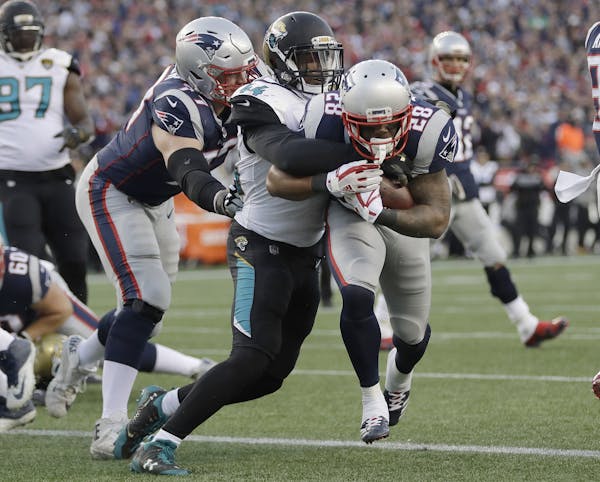The Vikings knew they were coming. Every Eagles opponent knows to expect the run-pass option plays made popular in the college ranks and now seeping into the NFL through progressive minds like Philadelphia coach Doug Pederson.
The Vikings' preparation didn't matter. Eagles quarterback Nick Foles pulled the ball from Jay Ajayi's hands and threw an 11-yard completion to Nelson Agholor on the first play of the 38-7 victory in the NFC Championship Game.
The Patriots defense is wary of the concept that's helping to lift Foles and the Eagles heading into Sunday's Super Bowl at U.S. Bank Stadium.
"It's hard because they do a great job," New England linebacker Kyle Van Noy said. "It starts with their O-line. Their run-pass fakes, half of the line is pass dropping, the other half is run blocking. So you just have to pay attention to your keys. They make a lot of hay with it."
The Eagles' third-ranked scoring offense is an amalgamation of concepts picked up by Pederson, offensive coordinator Frank Reich and their assistants. The run-pass options are "a small piece," Foles said, but perhaps have been one of the most effective elements of the offense in two playoff victories over the Vikings and Falcons.
The "RPOs," as they are known in football jargon, are a relatively recent concept with Pederson. He first picked them up in Kansas City when the Chiefs acquired quarterback Alex Smith from the 49ers. Then the Chiefs offensive coordinator, Pederson watched tape of Smith execute the plays in San Francisco and wanted to bring that success to Kansas City.
"I hadn't really been exposed to it much in my career as a coach or player," Pederson said. "It was something we studied and each year we started incorporating more of it into our offense. Then with Carson [Wentz], kind of kept it going."
Pederson indicated the Eagles further leaned on run-pass option concepts since Foles took over after Wentz suffered a season-ending knee injury in Week 14. Foles, a maligned backup quarterback, has lifted the Eagles with his play, completing 64 percent of his throws for 1,037 yards and eight touchdowns with two interceptions in about five games' worth of snaps as Philadelphia QB this season.
The Eagles have leaned on Foles' ability to read, react and quickly deliver the ball.
"Finding that Nick's strengths are just that," Pederson said, "trying to limit the formations, limit the motions and limit the shifting. Try to just allow him to see the defense and execute the play."
The Eagles successfully run a variety of run-pass options out of similar formations, easing execution for Foles while keeping defenses guessing.
"You never know when it's coming because everything looks the same," Foles said.
Difficulty for defenses, such as the Patriots' on Sunday, is rooted in respect for the Eagles' third-ranked run game that averaged 132.2 yards per game during the regular season. A trio of Ajayi, LeGarrette Blount and Corey Clement force defenses to hesitate, watching a Foles handoff that could be real or fake.
Eagles receivers play it like a pass on the outside, running a combination of quick routes. Pressure to quickly beat defensive backs falls on receivers, said Philadelphia wideout Torrey Smith, because they also don't know if it's going to be a run or pass.
"Sometimes it's hit or miss; that's why it's a choice," Smith said. "We have to make sure Foles makes the right decision and also we have to make sure we make him right, because if he pulls [the ball] he's stuck."
Smith said he hopes the Eagles can "steal one" against the Patriots and their coaches, known as masters of the X's and O's chess game.
"You go against a team like the Patriots, they're not just going to let you make plays," Smith said. "There may be a time or a place where we can steal one, but that's something we've been able to do well to get the ball rolling. I expect fully they'll try to figure out a way to take it away."
